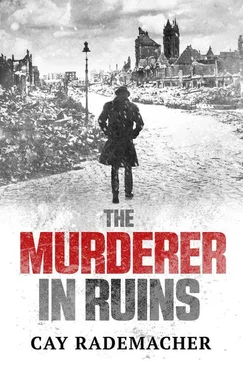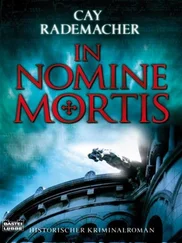Cay Rademacher - The Murderer in Ruins
Здесь есть возможность читать онлайн «Cay Rademacher - The Murderer in Ruins» весь текст электронной книги совершенно бесплатно (целиком полную версию без сокращений). В некоторых случаях можно слушать аудио, скачать через торрент в формате fb2 и присутствует краткое содержание. Год выпуска: 2015, ISBN: 2015, Издательство: Arcadia Books Limited, Жанр: Триллер, на английском языке. Описание произведения, (предисловие) а так же отзывы посетителей доступны на портале библиотеки ЛибКат.
- Название:The Murderer in Ruins
- Автор:
- Издательство:Arcadia Books Limited
- Жанр:
- Год:2015
- ISBN:9781910050750
- Рейтинг книги:5 / 5. Голосов: 1
-
Избранное:Добавить в избранное
- Отзывы:
-
Ваша оценка:
- 100
- 1
- 2
- 3
- 4
- 5
The Murderer in Ruins: краткое содержание, описание и аннотация
Предлагаем к чтению аннотацию, описание, краткое содержание или предисловие (зависит от того, что написал сам автор книги «The Murderer in Ruins»). Если вы не нашли необходимую информацию о книге — напишите в комментариях, мы постараемся отыскать её.
The Murderer in Ruins — читать онлайн бесплатно полную книгу (весь текст) целиком
Ниже представлен текст книги, разбитый по страницам. Система сохранения места последней прочитанной страницы, позволяет с удобством читать онлайн бесплатно книгу «The Murderer in Ruins», без необходимости каждый раз заново искать на чём Вы остановились. Поставьте закладку, и сможете в любой момент перейти на страницу, на которой закончили чтение.
Интервал:
Закладка:
Stave followed her into the villa’s winter garden, wondering how much he ought to tell her.
‘I’m not here about the rubble murderer,’ he said, sitting down.
‘Another investigation?’
‘Maybe. I don’t know yet. It’s early days.’
‘And you need my help?’
‘I need a little girl’s help.’
Therese Dubois smiled. A knowing smile, Stave reckoned.
‘Anouk Magaldi. You asked me her name when you were last here. I wondered why, and wondered when you would come back and tell me.’
‘Can I have a word with her?’
‘Why?’
‘She seemed to know one of my colleagues. It was as if she recognised him.’
Therese Dubois looked at him silently.
‘My colleague knows nothing about this,’ the chief inspector added. ‘I have reason to doubt just who my colleague really is.’
‘You think he might have been a Nazi?’
‘Lots of people were Nazis. What I want to know is what sort of Nazi.’
‘You mean if he might be somebody public prosecutor Ehrlich ought to be interested in?’
Stave dithered for a moment, then said, ‘Yes.’
‘I’ll go and fetch her.’
A few minutes later the little girl was standing in front of him: skinny for her age, arms and legs like matchsticks, big eyes, long dark hair. Stave held out his hand for her to shake, but she paid no attention, just stood staring at him, cautiously.
‘Do you speak German?’ he asked.
She shook here head.
‘I’ll translate for her,’ Therese Dubois said.
‘When you saw my colleague, why did you do this?’ Stave asked, making the throat-cutting gesture with his hand.
The warden had barely said two words before the little girl broke into a torrent of words, speaking as if she was out of breath, running, made a gesture as if she was throwing something, ducked down to avoid it, closed her eyes, looked terrified, made as if to run off.
Stave didn’t understand a word of it, but even before Therese Dubois had begun to translate for him, he realised he was going to hear a story of some atrocity.
‘Anouk is Jewish. She and her relatives lived in a little village northwest of Limoges,’ the warden explained. ‘So they had to be particularly discreet during the German occupation. In the summer of ’44 soldiers came into their village and they hid in a cellar, something most of the other inhabitants didn’t feel the need to do.’
‘What sort of soldiers?’
‘Germans. Waffen-SS. The invasion of Normandy had happened four days earlier. The soldiers were on their way to the front. Most of the French thought the German occupation would soon be over. The Resistance was launching ever more attacks. And the SS had decided to take their revenge. There and then.’
Stave said nothing, waited for her to continue.
‘They took all the men and teenage boys, locked them in sheds or garages and shot them. They forced all the women and children into the church. Then they set fire to it, threw hand grenades in and fired into the blaze. By the end nearly everybody was dead, more than 600 people, a third of them children.’
Anouk’s parents were discovered and shot. She only escaped by hiding behind a table overloaded with bits of wood and tools. The SS men didn’t notice her. But she crept over to a window, looked out and saw it all. After the massacre the SS set fire to all the remaining houses. When it finally got too hot for her in the cellar, she sneaked out. Nobody spotted her, and the next day she bumped into a Resistance group. That was what saved her. Only a handful of others survived.’
Stave looked at the little girl and said, ‘And the man I was with the other day was one of the soldiers?’
The warden translated. The little girl nodded. Then another torrent of words and gestures. She walked to one side and put her finger to her throat.
‘He belonged to the troop that dragged her parents from the cellar and later she saw him firing into the church and laughing.’
Stave closed his eyes and tried to imagine Maschke as a tough young man in the black uniform with the peaked hat that came low over the eyes, with the death’s head on it. Or more likely in his grey SS helmet with the twin lightning flashes on each side, a cigarette in his mouth.
‘What was the name of the village?’ he asked eventually.
‘Oradour-sur-Glane.’
‘When was the massacre?’
‘10 June 1944.’
Stave pulled out the map of France he had taken from Maschke’s drawer and laid it out on the floor. The girl stared at him silently.
‘Can you point out on this map where the village is?’
The warden looked at it and finally picked a spot almost right in the middle of the country.
The chief inspector bent down and looked at the map. Exactly at the point she indicated was a pencil mark: ‘10 June ’44.’
On the way back Stave drove unusually slowly. Lothar Maschke’s real name was Hans Herthge, and he wasn’t on a U-boat but was a soldier in the Waffen-SS. He was a murderer, jointly responsible for the deaths of more than 600 people.
And we’re getting worked up over four deaths, but then corrected himself: we should be getting worked up – murder is murder.
What was he to do? He had the testimony of an eight-year-old. Therese Dubois promised him the little girl would testify in court, as if Stave might go there and then to the public prosecutor. But what could Ehrlich do? If he was found guilty, Maschke would face the death penalty. But was the testimony of an eight-year-old girl enough to sentence a police officer to death? And could it even be proved that Maschke was Hans Herthge? There was the map, but Stave had stolen it from his colleague’s desk under questionable circumstances. What might a skilled defence lawyer do with that? The likely result was that Maschke would walk free for lack of evidence. And Stave would be a grass. The man who ratted on a colleague. He might as well pick up his hat and coat and leave the force.
I need to talk to Ehrlich, he thought to himself. In confidence. See what we can do. Get more proof. Then all of a sudden he slammed on the brakes, and the car came to a juddering halt.
Ehrlich had been in Maschke’s office that evening. He hadn’t told Stave why he wanted to talk to the vice squad man. Maybe he hadn’t wanted to talk to him. Maybe the public prosecutor wanted to do the same as the chief inspector: to rummage round in Maschke’s desk drawers, but for a different reason. Maybe Ehrlich knew something about Maschke’s dark secret. What was it Therese Dubois had said? That Ehrlich was always digging up new cases. That he was out for revenge. Somebody who has a lot of accounts to settle with the Nazis.
Stave stared out of the dirty windscreen. A man pushing a bicycle with bent forks along the pavement stared at him suspiciously, then hurried on his way. The chief inspector ignored him. Who was playing what game here? No wonder Maschke hadn’t wanted to be in the building when they had first come to the children’s home. No wonder that he wasn’t happy with their research into Displaced Persons. He must have been afraid somebody he had nearly killed might recognise him? Any Jew, any refugee who had survived something like that might have recognised him and blown his cover. No wonder Maschke had been so keen to suggest the killer was some black marketeer. No wonder he had used physical force to try to make the first possible suspect they had come across confess.
Was it Maschke who had stolen the files then? Was there something in them that might have given a clue to his SS past? If so, what was it? A shiver ran down Stave’s spine and he knew it wasn’t because of the cold wind blowing into the car.
His thoughts turned to the public prosecutor. Had Ehrlich ever been interested in the rubble murderer at all? Or had he already had his suspicions about Maschke/Herthge, and was just using the case to lure him into a trap? Had the public prosecutor been poking around late at night in Stave’s own office, like he had attempted to do in Maschke’s? Could it have been Ehrlich who had taken the case files? There again, Stave couldn’t think of any reason to suspect him, any motive, anything he had said or done.
Читать дальшеИнтервал:
Закладка:
Похожие книги на «The Murderer in Ruins»
Представляем Вашему вниманию похожие книги на «The Murderer in Ruins» списком для выбора. Мы отобрали схожую по названию и смыслу литературу в надежде предоставить читателям больше вариантов отыскать новые, интересные, ещё непрочитанные произведения.
Обсуждение, отзывы о книге «The Murderer in Ruins» и просто собственные мнения читателей. Оставьте ваши комментарии, напишите, что Вы думаете о произведении, его смысле или главных героях. Укажите что конкретно понравилось, а что нет, и почему Вы так считаете.











